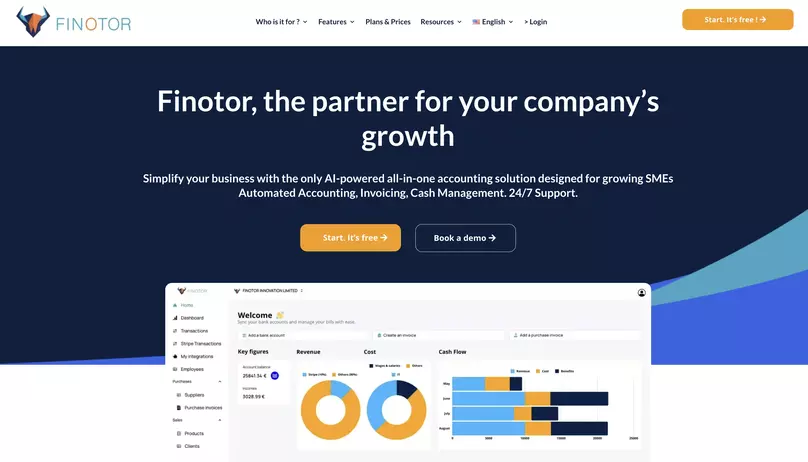Contents
- 1 A. Increased efficiency and automation
- 2 B. Improved accuracy and data analysis
- 3 C. Increased accessibility and collaboration
- 4 A. Cloud-based accounting software
- 5 B. Artificial intelligence and machine learning
- 6 C. Blockchain technology
- 7 D. Mobile apps for accounting
- 8 A. Cost and training
- 9 B. Data security and privacy
- 10 C. Maintaining compliance
- 11 A. Predictions and trends
- 12 B. Potential impact on the profession
- 13 C. The importance of staying informed and adapting
The field of accounting has undergone a significant transformation in recent years, thanks in large part to advancements in technology. From cloud-based accounting software to artificial intelligence and machine learning, technology has played a vital role in modernizing accounting practices and making them more efficient, accurate, and accessible. This blog post aims to explore the role of technology in modern accounting, including the benefits it provides, the types of technology being used, the challenges of implementing technology in accounting, and the future of technology in the profession.
Accounting, at its core, is the process of measuring, processing, and communicating financial information. This can include tasks such as creating financial statements, managing accounts payable and receivable, and preparing taxes. Historically, accounting has been a labor-intensive and time-consuming process, with many tasks done manually. However, with the advent of technology, many of these tasks can now be automated and streamlined, saving time and reducing the risk of errors.
One of the primary benefits of technology in modern accounting is increased efficiency and automation. Many accounting tasks, such as data entry and record-keeping, can be automated using software. This not only saves time but also reduces the risk of errors, as software is less prone to human error than manual processes. Additionally, technology has also allowed for improved accuracy and data analysis, with tools such as artificial intelligence and machine learning being used to analyze financial data and identify patterns or trends.
Another benefit of technology in modern accounting is increased accessibility and collaboration. Cloud-based accounting software, for example, allows accountants and business owners to access financial information and collaborate on tasks from anywhere, at any time. This can be especially useful for businesses with multiple locations or employees who work remotely.
There are several types of technology being used in modern accounting, including cloud-based accounting software, artificial intelligence and machine learning, blockchain technology, and mobile apps for accounting. Cloud-based accounting software, such as Finotor, allows for real-time access to financial information and the ability to collaborate on tasks. Artificial intelligence and machine learning are being used to analyze financial data and identify patterns or trends. Blockchain technology, the technology behind cryptocurrencies like bitcoin, has the potential to revolutionize accounting by providing a secure and transparent way to store and share financial information. Mobile apps for accounting, such as Expensify and Wave, allow for easy tracking of expenses and income on-the-go.
While technology has brought many benefits to modern accounting, there are also challenges to implementing technology in accounting. One of the biggest challenges is cost and training. Implementing new technology can be expensive, and accountants will need to be trained on how to use it. Another challenge is data security and privacy. As financial information is sensitive, it is important to ensure that the technology being used is secure and compliant with regulations. Additionally, maintaining compliance with accounting standards and regulations can also be a challenge when implementing new technology.
Looking to the future, technology will continue to play a major role in modern accounting. Predictions and trends suggest that we can expect to see increased use of artificial intelligence and machine learning, as well as the continued growth of blockchain technology. These advancements have the potential to revolutionize the profession, making accounting more efficient and accurate than ever before. However, it is important for accountants to stay informed about the latest technology and developments in the field, in order to fully take advantage of these advancements and adapt to the changing landscape of accounting.
Technology has played :
- A vital role in modernizing accounting practices, making them more efficient, accurate, and accessible. From cloud-based accounting software to artificial intelligence and machine learning, there are many types of technology being used in modern accounting. However, implementing technology also comes with its own.
- A significant role in modernizing accounting practices, providing many benefits such as increased efficiency and automation, improved accuracy and data analysis, and increased accessibility and collaboration. By using technology such as cloud-based accounting software, artificial intelligence and machine learning, blockchain technology and mobile apps for accounting, accountants and business owners can streamline their work processes and make better decisions.
However, implementing technology in accounting also comes with its own set of challenges, including cost and training, data security and privacy, and maintaining compliance. Despite these challenges, it is clear that technology will continue to play an important role in the field of accounting in the future.
1- What is the Benefits of Technology in Modern Accounting
A. Increased efficiency and automation
One of the primary benefits of technology in modern accounting is increased efficiency and automation. Many accounting tasks, such as data entry and record-keeping, can be automated using software. This not only saves time but also reduces the risk of errors, as software is less prone to human error than manual processes. Automation also allows for faster processing of financial information, giving businesses more time to focus on other important tasks.
B. Improved accuracy and data analysis
Technology has also allowed for improved accuracy and data analysis, with tools such as artificial intelligence and machine learning being used to analyze financial data and identify patterns or trends. This improved accuracy allows businesses to make more informed decisions and identify potential issues before they become a problem. Additionally, data analysis tools can help identify areas where a business can improve and make cost-saving changes.
C. Increased accessibility and collaboration
Another benefit of technology in modern accounting is increased accessibility and collaboration. Cloud-based accounting software, for example, allows accountants and business owners to access financial information and collaborate on tasks from anywhere, at any time. This can be especially useful for businesses with multiple locations or employees who work remotely. Additionally, technology also allows for easy sharing of financial information with business partners, such as investors and lenders, which can help secure funding and support for the business.
The technology has brought many benefits to modern accounting, including increased efficiency and automation, improved accuracy and data analysis, and increased accessibility and collaboration. These benefits can help businesses to save time, make better decisions, and stay competitive in today’s fast-paced business environment.
2- Types of Technology Used in Modern Accounting
A. Cloud-based accounting software
Cloud-based accounting software, such as Finotor, allows for real-time access to financial information and the ability to collaborate on tasks. With cloud-based accounting software, businesses no longer need to rely on physical storage, such as servers and hard drives, which can be vulnerable to data loss and security breaches. Instead, financial information is stored on servers in remote locations and can be accessed from anywhere with an internet connection. This allows for increased flexibility and accessibility, as well as the ability to collaborate with other team members in real-time.
B. Artificial intelligence and machine learning
Artificial intelligence and machine learning are being used to analyze financial data and identify patterns or trends. This allows businesses to make more informed decisions and identify potential issues before they become a problem. AI and machine learning can also be used for tasks such as fraud detection, which can save businesses time and money. Additionally, these technologies can help to automate many tasks, such as data entry and record-keeping, which can save time and reduce the risk of errors.
C. Blockchain technology
Blockchain technology, the technology behind cryptocurrencies like bitcoin, has the potential to revolutionize accounting by providing a secure and transparent way to store and share financial information. Blockchain technology uses a distributed ledger system, which means that all transactions are recorded on multiple computers, rather than just one central server. This makes the system more secure and resistant to hacking and fraud. Additionally, blockchain technology can also be used to create smart contracts, which are self-executing contracts with the terms of the agreement written into lines of code.
D. Mobile apps for accounting
Mobile apps for accounting, such as Expensify and Wave, allow for easy tracking of expenses and income on-the-go. These apps can be used to take pictures of receipts, track expenses and income, and even generate invoices. This allows business owners to stay on top of their finances while they are away from their office, and can also be useful for employees who travel frequently.
So, technology has brought many benefits to modern accounting, including increased efficiency and automation, improved accuracy and data analysis, and increased accessibility and collaboration. These benefits can help businesses to save time, make better decisions, and stay competitive in today’s fast-paced business environment. Each of the technologies mentioned above plays a unique role in modernizing the field of accounting and making it more efficient, accurate and accessible.
3- Challenges of Implementing Technology in Accounting
A. Cost and training
Implementing new technology in accounting can be expensive, and accountants will need to be trained on how to use it. This can be a significant challenge for small businesses that may not have the budget for expensive software or the resources to train employees. Additionally, new software may not be compatible with existing systems, which can add further costs.
B. Data security and privacy
As financial information is sensitive, it is important to ensure that the technology being used is secure and compliant with regulations. This can be a significant challenge, as new technologies are constantly emerging, and it can be difficult to keep up with the latest security measures. Additionally, businesses must also be able to protect personal and financial data of their clients, and comply with regulations such as the General Data Protection Regulation (GDPR) and the California Consumer Privacy Act (CCPA).
C. Maintaining compliance
Another challenge of implementing technology in accounting is maintaining compliance with accounting standards and regulations. This is especially challenging as technology is constantly evolving, and new regulations are being introduced all the time. Additionally, new software may not be fully compliant with existing regulations, which can lead to penalties and fines.
While technology has brought many benefits to modern accounting, there are also challenges to implementing technology in accounting. One of the biggest challenges is cost and training. Implementing new technology can be expensive, and accountants will need to be trained on how to use it. Another challenge is data security and privacy. As financial information is sensitive, it is important to ensure that the technology being used is secure and compliant with regulations. Additionally, maintaining compliance with accounting standards and regulations can also be a challenge when implementing new technology.
4- The Future of Technology in Accounting
A. Predictions and trends
Looking to the future, technology will continue to play a major role in modern accounting. Predictions and trends suggest that we can expect to see increased use of artificial intelligence and machine learning, as well as the continued growth of blockchain technology. These advancements have the potential to revolutionize the profession, making accounting more efficient and accurate than ever before. Additionally, advancements in natural language processing and data visualization are expected to make it easier for businesses to understand and use financial data.
B. Potential impact on the profession
The advancements in technology have the potential to change the way accounting is done in the future. AI and machine learning can automate many tasks, such as data entry and record-keeping, which can save time and reduce the risk of errors. Additionally, blockchain technology can provide a secure and transparent way to store and share financial information. These developments will likely lead to a reduction in the number of manual tasks and make the profession more efficient.
C. The importance of staying informed and adapting
With technology constantly evolving, it is important for accountants to stay informed about the latest technology and developments in the field, in order to fully take advantage of these advancements and adapt to the changing landscape of accounting. This will not only help accountants to stay competitive in the job market, but also to provide better service to their clients. Additionally, businesses should also be aware of the latest technology trends and developments, and be prepared to adapt and implement them in their operations.
In summary, the future of technology in accounting is promising with predictions and trends suggesting that we can expect to see increased use of artificial intelligence and machine learning, as well as the continued growth of blockchain technology. These advancements have the potential to revolutionize the profession, making accounting more efficient and accurate than ever before. However, it is important for accountants to stay informed about the latest technology and developments in the field, in order to fully take advantage of these advancements and adapt to the changing landscape of accounting.
The future of accounting technology is promising with predictions and trends suggesting that we can expect to see increased use of artificial intelligence and machine learning, as well as the continued growth of blockchain technology. These advancements have the potential to revolutionize the profession, making accounting more efficient and accurate than ever before. However, it is important for accountants to stay informed about the latest technology and developments in the field, in order to fully take advantage of these advancements and adapt to the changing landscape of accounting.
In order to stay ahead of the curve, it is crucial for accountants to embrace technology, and become familiar with the tools and platforms that are available to them. By doing so, they will be better equipped to serve the needs of their clients and stay competitive in an ever-evolving industry.
Technology has been a game-changer in the field of accounting, and it will continue to be so in the future. While there are challenges that come with implementing technology, the benefits outweigh the challenges and it is a necessary step to stay competitive in today’s business world. The role of technology in modern accounting is not only to streamline the work process, but also to make better decisions, and this is something that should be embraced by the accounting profession.









